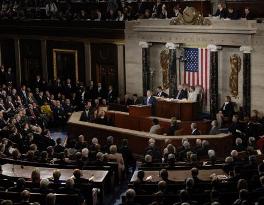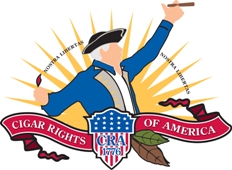News: Senators Push FDA to Regulate Cigars, Ban Flavored Cigars
2 May 2012
According to an announcement by U.S. Senators Dick Durbin (D-IL) and Frank Lautenberg (D-NJ), the Senate Appropriations Committee added language to the 2013 appropriations bill for the Subcommittee on Agriculture, Rural Development, FDA, and Related Agencies that encourages the FDA to regulate cigars and ban “flavored” cigars.
 The move came just as cigar enthusiasts passed the 25,000 signature threshold on a petition asking the White House to order the FDA not to expand its authority to include premium cigars. By reaching 25,000 signatures, the petition will now receive an official response from the Obama Administration.
The move came just as cigar enthusiasts passed the 25,000 signature threshold on a petition asking the White House to order the FDA not to expand its authority to include premium cigars. By reaching 25,000 signatures, the petition will now receive an official response from the Obama Administration.
The FDA appropriations bill, including the language pushing regulation of cigars, now moves to the Senate floor to be scheduled for a full vote. So far there is no indication that similar language will be included in the House version of the bill.
As in most anti-tobacco efforts, the senators cite “children” as the impetus for more regulation, despite the fact that it will exclusively be the legal choices of adults that will limited by FDA regulation of cigars. “The emergence of flavored cigars is a transparent effort by Big Tobacco to work around the new tobacco control law,” claimed Durbin (pictured), even though handmade premium cigars by companies like CAO, Rocky Patel, and Drew Estate are likely to be included in a “flavored cigar” ban.
Durbin and Lautenberg assert, without citing any evidence, that “cigars with candy-like [sic] flavorings such as strawberry, watermelon, vanilla, and chocolate are marketed to young people, and get them hooked on this deadly and addictive habit at a young age.” Nowhere do the Senators explain why or how these flavors are “candy-like” (considering that fruits and other flavors like chocolate and vanilla were in existence for centuries before they were used in candy) nor do they address the fact that they are primarily enjoyed by adults.
Regulation of cigars by the FDA could be devastating to the premium cigar industry, which helps provide 85,000 jobs in the U.S. and hundreds of thousands in Latin America. Ingredient disclosure, testing, and marketing restrictions would stifle the development of new cigar blends and eliminate events where cigar makers pass out free samples to cigar shop patrons.
Concerned cigar smokers may want to contact members of the House Subcommittee on Agriculture, Rural Development, FDA, and Related Agencies, especially subcommittee Chair Jack Kingston (R-GA), to add language opposing the Senate’s push to have the FDA regulate cigars. They also should contact their senators to oppose the passage of the bill with the anti-cigar language and follow the IPCPR and CRA for updates.
photo credit: Flickr

 “The FDA is considering the creation of regulations for the premium cigar industry. These regulations will jeopardize over 85,000 American jobs, destroy America’s “mom & pop†premium cigar retailers & manufacturers, and risk over 250,000 jobs in Latin America that produce cigars, impacting the economic/political stability in the region. We hope you will stand up for small businesses that dot Main Street America & recognize that premium cigars are enjoyed by adults, are not addictive, and therefore do not conform to the Congressional intent of the Family Smoking Prevention & Tobacco Control Act. Tell the FDA to leave our premium cigars alone. With this nation’s more pressing issues, harming my simple ability to enjoy a cigar should not be a priority of the government.”
“The FDA is considering the creation of regulations for the premium cigar industry. These regulations will jeopardize over 85,000 American jobs, destroy America’s “mom & pop†premium cigar retailers & manufacturers, and risk over 250,000 jobs in Latin America that produce cigars, impacting the economic/political stability in the region. We hope you will stand up for small businesses that dot Main Street America & recognize that premium cigars are enjoyed by adults, are not addictive, and therefore do not conform to the Congressional intent of the Family Smoking Prevention & Tobacco Control Act. Tell the FDA to leave our premium cigars alone. With this nation’s more pressing issues, harming my simple ability to enjoy a cigar should not be a priority of the government.” The
The  Ever since June 2009 when President Obama signed the “Family Smoking Prevention and Tobacco Control Act,†my colleagues and I have written ad nauseam about the danger of granting the FDA jurisdiction over handmade cigars. In fact, our warnings on the subject date back to the summer of
Ever since June 2009 when President Obama signed the “Family Smoking Prevention and Tobacco Control Act,†my colleagues and I have written ad nauseam about the danger of granting the FDA jurisdiction over handmade cigars. In fact, our warnings on the subject date back to the summer of  At a time when it seems Congress might have trouble agreeing that the sun will come up tomorrow, the list of about 90 proponents presents a bipartisan bonanza. Sure, most of them are Republicans, as you’d expect for a proposal to reduce regulation. But look further.
At a time when it seems Congress might have trouble agreeing that the sun will come up tomorrow, the list of about 90 proponents presents a bipartisan bonanza. Sure, most of them are Republicans, as you’d expect for a proposal to reduce regulation. But look further. Copperman was the longtime owner of the Bethesda Tobacco shop just outside Washington, where he spent countless hours educating people on the artisan aspects of premium cigars. (Notably, he graciously conducted a highly educationalÂ
Copperman was the longtime owner of the Bethesda Tobacco shop just outside Washington, where he spent countless hours educating people on the artisan aspects of premium cigars. (Notably, he graciously conducted a highly educational  Patrick Ashby
Co-Founder & Editor in Chief
Patrick Ashby
Co-Founder & Editor in Chief Patrick Semmens
Co-Founder & Publisher
Patrick Semmens
Co-Founder & Publisher George Edmonson
Tampa Bureau Chief
George Edmonson
Tampa Bureau Chief